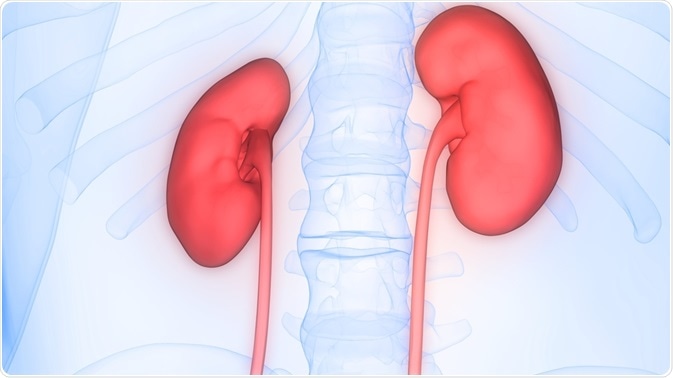After a kidney transplant, it is important to return to normal life, whilst also taking care to ensure the success of the transplant.

Magic mine | Shutterstock
This article provides specific recommendations for kidney transplant recipients that promote a healthy lifestyle and reduce the risk of damage to the transplanted organs.
Emergency medical identification
It is recommended that any organ transplant recipient wears a medical identification bracelet or necklace at all times. For those who have received a kidney transplant, it is important that this form of medical identification includes “immunosuppressed.”
Take medications as directed
Patients who have received a kidney transplant need to regularly take certain medications to ensure that their new kidney is working properly. While some medications will need to be taken indefinitely, others may only be necessary for a specific amount of time. These medications include:
- Immunosuppressants (Anti-rejection drugs)
- Antibiotics/antiviral medications
- Symptomatic medications
Symptomatic medications are used to reduce common side effects following a kidney transplant, including:
- Constipation
- Stomach ulcers
- Diarrhea
- Pain
- Nutritional deficiencies
Patients are also strongly urged to always consult with their transplant team prior to taking any new medication, such as over-the-counter medicines and herbal remedies, as many medications have the potential to interact with immunosuppressants.
Kidney Transplant | Antara's Story
Smoking
It is strongly recommended that kidney transplant recipients who are previous smokers quit as soon as possible. In general, cigarettes are associated with a significant increase in a person’s risk of heart disease, cancer, and lung disease. Patients who have continued to smoke after receiving a kidney transplant are twice as likely to suffer from kidney failure as compared to those who are non-smokers.
Avoid alcohol and drugs
Drinking excessively can be dangerous for kidney transplant recipients, as this raises blood pressure. Additionally, alcohol is high in calories, which can cause patients to gain weight if they are drinking on a regular basis.
The recommended limits of alcohol for kidney transplant recipients are 3-4 units a day for men and 2-3 units a day for women. It is recommended that no more than 14 units of alcohol are consumed, with at least a few alcohol-free days, each week, for both male and female kidney transplant recipients.
The use of illegal drugs of abuse should be avoided, as these drugs can potentially damage kidneys, lead to a sudden and prolonged rise in blood pressure and/or negatively interact with immunosuppressive medications.
Is diet important?
Kidney transplant recipients are advised to consume a generally healthy diet, of which includes at least five servings of fruit and vegetables each day. In addition, it is recommended that a major portion of a patient’s healthy diet includes starchy foods like potatoes, bread, rice and pasta.
The consumption of some dairy products, meat, fish, eggs, beans and other non-dairy sources of protein is also important. Fats and sugars should be taken in moderation, whereas salts should be avoided as much as possible, as salty food can raise blood pressure.
Weight loss and exercise
Once the patient has recovered from the surgery, regular physical activity is recommended. For adults, at least 150 minutes (2 hours and 30 minutes) of moderate-intensity physical or aerobic activity every week is ideal.
Moderately intense activity should involve any type of exercise that increases the heart and breathing rate, and can also make the person sweat. Some examples of this type of exercise include jogging, swimming, fast walking, tennis and much more.
Kidney transplant recipients who are overweight or obese are strongly urged to incorporate both regular exercise and a healthy and calorie-controlled diet into their lives in order to reach a healthy weight.
How to avoid infection
Patients taking immunosuppressive medications are immunocompromised and are therefore at a higher risk of acquiring infections as compared to healthy individuals. To prevent infections, good personal hygiene, such as regular hand washing before eating and after using the bathroom, should be maintained. Additionally, contact with individuals with contagious infections, such as the flu or chicken pox, should be avoided as much as possible.
Care should be taken not to cut or graze the skin in order to avoid potential infections. Vaccinations against infections are important; however, some vaccines that contain live viruses, such as the mumps, measles, and rubella (MMR) vaccine, cannot be administered after a patient has received a kidney transplant.
Sexual activity
Sexual intercourse should be avoided until the abdominal incision wound from the transplant surgery has completely healed, which can take approximately 4 to 6 weeks.
It is also important to recognize that a person’s sexuality can also be affected following kidney transplantation. For example, kidney failure can cause a cascade of problems in regard to a person’s sexuality, of which can include impotence in men and a decreased sexual drive, as well as irregular menstrual cycles in women. Alternatively, patients who have previously experienced these effects may find that their sexual function has improved.
Since kidney transplant recipients must often take blood pressure medication following their surgery, these drugs have the potential to interfere with sexual function. Some effects of these medications include drowsiness, fatigue, decreased sexual drive, menstrual cycle irregularities and/or reduced vaginal lubrication.
In addition, transplant recipients may not enjoy sexual experiences as much as they did prior to taking this class of medications. The patient’s transplant team and/or a counselor can provide guidance to patients experiencing these sexual function effects following a kidney transplant.
How soon can I get pregnant?
It is recommended that women who have received a kidney transplant avoid getting pregnant for at least for one year after the surgery. Since a kidney transplant carries many risks for both the health of the mother and fetus, a woman who is planning to get pregnant in the future should discuss these risks with her clinician.
Kidney Transplantation - The Operation
Further Reading
Last Updated: Nov 29, 2018